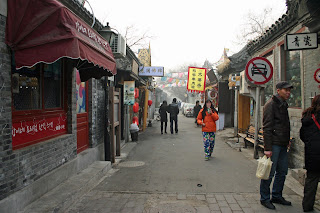 |
| I'm staying in Dongcheng, in the very heart of the city. |
The very
centre is packed full of ancient hútòng that date from the Ming dynasty and
were built as part of a regeneration of the city after Genghis Khan destroyed
it. The tiny streets are packed with little shops, tea rooms, hole-in-the-wall
food outlets (like the soup above which cost £1 and is bursting with lovely fresh spicy flavours) that sell everything from fruit kebabs to deep fried beasts and are also packed, shoulder to shoulder with
family homes. Off the main drags, people go about their daily lives, the pace of which doesn't appear to have changed for hundreds of years.
Běijīng is a very Chinese city. There is no mistaking it for anywhere else and by that I mean that some cities I have visited are so devoid of character, they could be anywhere on earth. I expected a big, shiny, steel and concrete city of mega proportions, but this town has little evidence of any overriding western influence but at the same time feels very familiar. Everyone I have encountered has that same chatty warmth that visitors attribute to the Welsh. There is a playfulness and a sense of humour everywhere you look, something that is sorely lacking in Russia.
I discovered just how big Běijīng is when attempting to walk
to the Forbidden City from my hostel. After about two hours and a pulled muscle
(I later learned about 'Běijīng Knee')I called a rickshaw to my rescue. I later discovered that Běijīng is
roughly the same size as Belgium. Note to self: use the subway.
The subway is 2 yuan (20p) to ride anywhere. Considering the
subway covers an area the size of Belgium, that’s cheap travel.
The Art District.
The Forbidden City.
Maostalgia central. Posters of Mao were banned when Deng Xiaoping took over, so there are surprisingly few around. People consider the years of the cultural revolution as a dark interlude, best left in the past.
Redundant sundial. It stands at around 7 feet tall
Ancient fire extinguisher. These were kept full of water in the event of a fire. All of the gold leaf has been scraped away and stolen, mostly during the Communist Revolution.
Worse than double denim?!
The ubiquitous cuppa, that comes in hundreds of different
varieties in any number of lovely tea houses, and costs around £1.50 a cup.
Běijīng is incredible. If this is what China holds in store,
I am in for the biggest, oldest, tastiest, friendliest treat!
http://www.bbc.com/travel/video/on-the-road/20130222-beijing-china

















































































No comments:
New comments are not allowed.